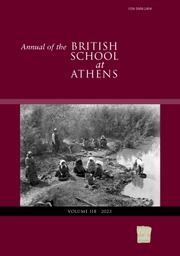Article contents
Hellenistic and Roman pottery deposits from the ‘Saranda Kolones’ castle site at Paphos1
Published online by Cambridge University Press: 27 September 2013
Abstract
The Crusader castle (now called ‘Saranda Kolones’) on the ancient site of Paphos was built and occupied c. AD 1192–1222. It overlies and partly truncates a series of ancient features (tombs, cisterns, wells, church remains, etc.). The layers associated with these, excavated at various times between 1957 and 1985, contain rich deposits spanning a period from the 4th century BC to the 8th/9th centuries AD.
Some 410 pottery items from the pre-Castle phases are presented here, mostly in a series of 16 selected deposits arranged in chronological order. These range from early tomb-groups to stratified well fills and an important destruction deposit of c. AD 650. The final ancient occupation (8th–9th centuries) is marked by the appearance of some lead-glazed wares and some imports from the Umayyad orbit.
Individual items of interest from other layers are appended. Some Hellenistic and Roman imports from Phoenicia and elsewhere are here documented in Cyprus for the first time. The later (Medieval) pottery from the site is reserved for publication in the main report on the castle (forthcoming).
- Type
- Articles
- Information
- Copyright
- Copyright © The Council, British School at Athens 2003
Footnotes
The excavations in question, under the sole direction (until 1980) of Megaw, were in the first years a project (prior to independence) of the Department of Antiquities of Cyprus, They were resumed in 1965 under the aegis of the British School at Athens and subsequently financed for some years by Dumbarton Oaks, Washington, DC. From 1981 onwards the project was co-directed with Professor J. Rosser (Boston College, MA), who in due course assumed full control for further fieldwork, with a continued financial input from Dumbarton Oaks. For further details see the various preliminary publications listed in the Select Bibliography.
My own involvement with the site dates from the 1965 season (when I had a small part in the excavations), and I have had an increasing role in the identification and processing of the pottery finds over the last 30 years. I thank Mr Megaw for subequendy inviting me to take charge of the final publication of this material. In the interim period, Dr C. Simon worked on some of the Late Hellenistic/Early Roman deposits listed here, but was forced by other commitments to abandon a projected publication; I thank him for making his preliminary texts and drawings available to me for the present work, which incorporates many of them in a revised version. The final versions are mostly my own work; some (along with many original pencil versions) are by S. Meade, C. Simon, and others. The later (Castle-period) pottery finds have been prepared for publication shortly in the major site-report by Megaw, D. Bakirtzis, and myself. The site-plan is by R. C. Anderson. Various others have assisted me over the years in the processing and study of the material, both on-site and in the Paphos Regional Museum, where it is now stored. In particular, I thank the successive custodians/curators of the Paphos Museum for facilities provided there in the course of several study sessions; without their help the present work could not have been brought to a satisfactory conclusion.
Special abbreviations:
Agora, v = H. S. Robinson, The Athenian Agora, v: Pottery of Roman Period: Chronology (Princeton, NJ, 1959).
Atlante II = (various authors), Enciclopedia dell'arte antica, classica e orientale, Atlante delle forme ceramiche, ii: Ceramica for romana nel bacino mediterraneo (tardo ellenismo e primo Impero) (Roma: Istituto della Enciclopedia Italiana, 1985/86).
Consp. = E. Ettlinger et al., Conspectus formarum terrae sigillatae italico modo confectae (Materialien zur römisch-germanischen Keramik, Heft 10; Bonn 1990).
du Plat Taylor and Megaw 1981 = J. du Plat Taylor and A. H. S. Megaw, ‘Excavations at Ayios Philon, the Ancient Carpasia, part II, The Early Christian Buildings’, RDAC 1981, 209–50.
Hayes 1978/1980 = J. W. Hayes, “Problèmes de la céramique des Viième–IXème siècles a Salamine et à Chypre”, in Salamine de Chypre, histoire et archéologie: État des recherches (Lyon, 13–17 mars 1978) (Colloques internationaux du CNRS, 578; Paris 1980), 375–87.
Hayes 1985 =J. W. Hayes, in J. Rosser, ‘Excavations at Saranda Kolones, Paphos, Cyprus, 1981–83’, DOP 39 (1985), 81–97.
Hayes 1992 = J. W. Hayes, Excavations at Saraçhane in Istanbul, ii: The Pottery (Princeton, NJ, 1992).
Johnson 1988 = B. L. Johnson, ‘The Pottery’, in G. D. Weinberg (ed.) et al., Excavations at Jalame. Site of a Glass Factory in Late Roman Palestine (Columbia, MO, 1988), 137–226.
Lichocka-Meyza 2001 = B. Lichocka and H. Meyza, ‘Seismic events and the evidence of coins and pottery: the case of destruction of the House of Aion in Paphos’, Études et travaux (Warsaw) 19 (2001), 145–208.
LRP = J. W. Hayes, Late Roman Pottery (London, 1972).
Megaw 1971 = A. H. S. Megaw, ‘Excavations at “Saranda Kolones”, Paphos: Preliminary Report on the 1966–67 and 1970–71 seasons’, RDAC 1971, 117–46.
Megaw 1972 = A. H. S. Megaw, ‘Supplementary excavations on a castle site at Paphos, Cyprus, 1970–1971’, DOP 26 (1972), 322–43.
Megaw and Rosser 2001 = A. H. S. Megaw and J. Rosser, ‘A Watchtower before Pafos Castle’, RDAC 2001, 319–34.
Oziol 1977 = T. Oziol, Salamine de Chypre VII: Les lampes du Musée de Chypre (Paris, 1977).
Paphos III = J. W. Hayes, Paphos III: The Hellenistic and Roman Pottery (Nicosia, 1991).
RDAC = Report of the Department of Antiquities, Cyprus (now entitled Επιστημονική Επετηρίς του Τμήματος Αρχαιοτήτων).
SCE iv. 3 = O. Vessberg, in id. and A. Westholm, The Swedish Cyprus Expedition, iv. 3: The Hellenistic and Roman Periods in Cyprus (Stockholm, 1956).
References
Select Bibliography
- 23
- Cited by


